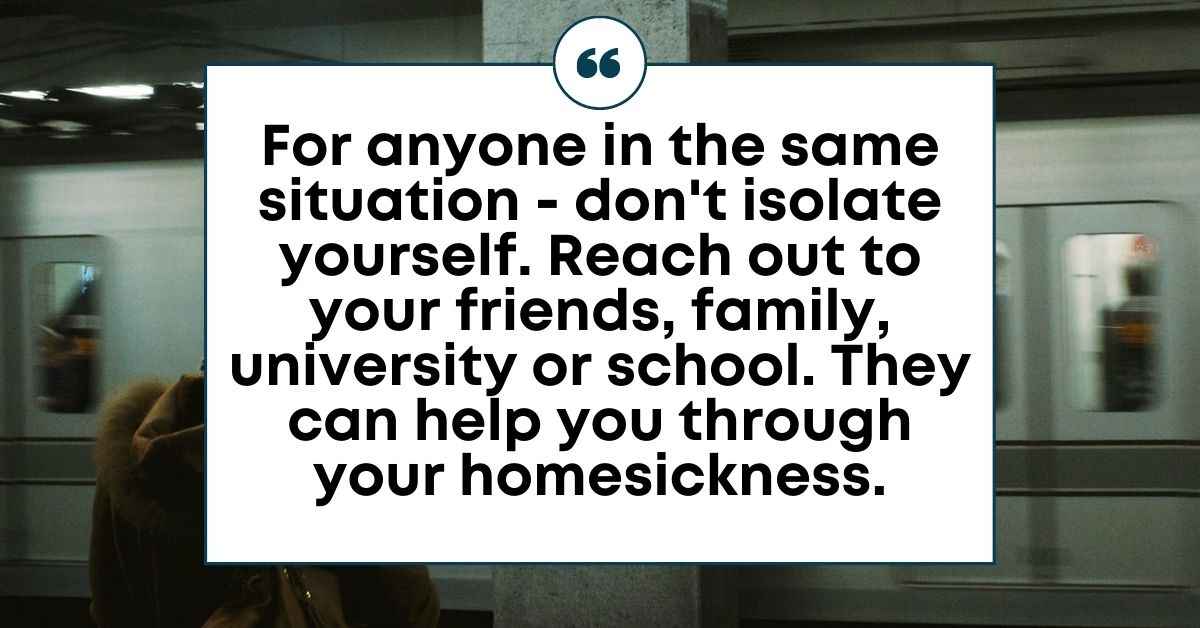Reviewed By Cara Swanston - Registered Member MBACP Adv. Dip.
Handling Homesickness
19 May 2021
Living and studying in a new country can be challenging, and as you adjust to a new routine in a new place, it’s normal to miss home. But once homesickness settles in, it’s important to take care of your mental health so it doesn’t take a knock for the worst.
Living and studying in a new country can be challenging, and as you adjust to a new routine in a new place, it’s normal to miss home. But once homesickness settles in, it’s important to take care of your mental health so it doesn’t take a knock for the worst.
Having moved to Belfast from his home country of India, Vishnu Eyyarambil experienced homesickness while studying at Ulster University. Vishnu shares his tips for looking after your wellbeing, while managing your feelings and settling into your new environment.
Moving to another country is an exciting experience, but it often comes with the reality of homesickness. If you’re reading this blog, then chances are you’re in a similar position and you’re missing home, too.
Living in Northern Ireland is my first time living so far away from my friends and family. Before moving to Belfast, I remember sleepless nights preparing for university interviews and admission tests, which luckily secured my place to study a Master’s degree at Ulster University.
On 14th October, I flew to the UK, but once I got through immigration in London Heathrow airport, I started feeling lonely and I missed my family. I found myself worrying if I had made the right decision to study abroad. When I called my parents, I started crying and asking if I should come back home, but they teased me and told me to give it a try, which made me feel better. After all, I had already arrived and I may as well give it a shot. My parents told me that if it wasn’t working, I could get a flight back, which made me feel a bit more confident.

The “coming and going” of homesickness
Belfast was an entirely new life for me. It was a new place, a new culture and a new lifestyle. Even though I decided to stick with my decision to leave India, it meant learning to deal with homesickness whenever it appeared. But within three days of arriving, I started to feel low again. My feelings of excitement and determination quickly disappeared and I felt anxious and alone.
I tried to motivate myself by repeating in my mind: ‘everything is going to be fine, just relax.’ I tried to be my own cheerleader by reminding myself of my reasons for coming here. I realised my curiosity for exploring new places helped to distract my mind from the spiralling thoughts and I found walking and hiking boosted my mood.
Loneliness and isolation
My homesickness got worse when the covid-19 lockdowns meant my classes were moved online and I felt even more isolated. With more time to think, my mind was racing. My mood felt low again and I struggled to focus on my studies, which made me stressed.
I quickly learned that isolation is the enemy. When I was feeling homesick the only thing running through my mind was to hide away, which became a trap to feeling more lonely and I struggled to get outside once lockdown increased my physical isolation.
I started going on nearby walks and exploring the Botanic Gardens. Getting outside and into nature, even in small doses, helped my homesickness subside. I would set a timer on my phone and walk until the timer went off, just so I could go outside with a sense of purpose. This really helped on the days when going outside was the last thing I wanted to do. When I was outside, it helped me feel less alone. I felt connected to something bigger than me, which made my worries feel smaller.

Find your community
One of the best ways to get over homesickness was to make new connections and form a sense of community. I used an app called Discord to find what’s nearby, such as groups or gaming, and the app helped me stay in contact with others with similar interests.
Connecting with other students in the same situation was a massive help as they were able to understand what I was feeling. Seeking out people with similar interests is a great way to find something to do with someone else.
Talk to your university
After a catch-up session with my course director, she recommended I get in touch with the student wellbeing team, who were able to give me advice on how to overcome my homesickness.
I told the student wellbeing team I was finding it hard to concentrate in class, that I wasn’t able to do my work and I wasn’t up for leaving my room. I told them how alone I felt, and even when I started to feel better, these feelings would come back. The team supported me at every step when it came to my studies. They followed up to see if I was managing the workload and helped me when I wasn’t.
For anyone in the same situation – reach out to your friends, family, university or school. They can help you through your homesickness and your student wellbeing team can put measures in place to make sure you don’t fall behind.

Top tips for homesickness
Whether it’s homesickness or loneliness, we can all feel this at certain times of life, especially when we step out of our comfort zones. Believe in yourself – just like you did in getting to this next chapter – and know that homesickness is a normal reaction to a change in culture. Getting a grip on your homesickness so it doesn’t lead to depression is important. Here are some suggestions on ways to help overcome those difficult feelings:
- Tell people about your feelings, whether it’s your university, school, friends or family
- Go out for walk, even a small one
- Video call someone you love and take them around with you when you’re out sightseeing – it will feel like they’re there with you
- Write any achievements you’ve had in your life which you’re proud of and read them in the morning to get yourself motivated
- Stay in regular contact with friends and family. On most weekends, I cooked with my parents on video-call, where my mum guided me through the measurements of spices so I could make food which tastes like home
- Make plans for each day and make sure that it happens
- Exercise – it will help you boost your endorphins and energy levels
Get Inspired Further
Growing Up in Division
I felt like there was no way out. It was like I was stuck in a rut where it was a straight line to crime, drugs, self destruction.
ymca ethnic minority support
Starting a new life in a new country can be a daunting experience. YMCA are here to help.



